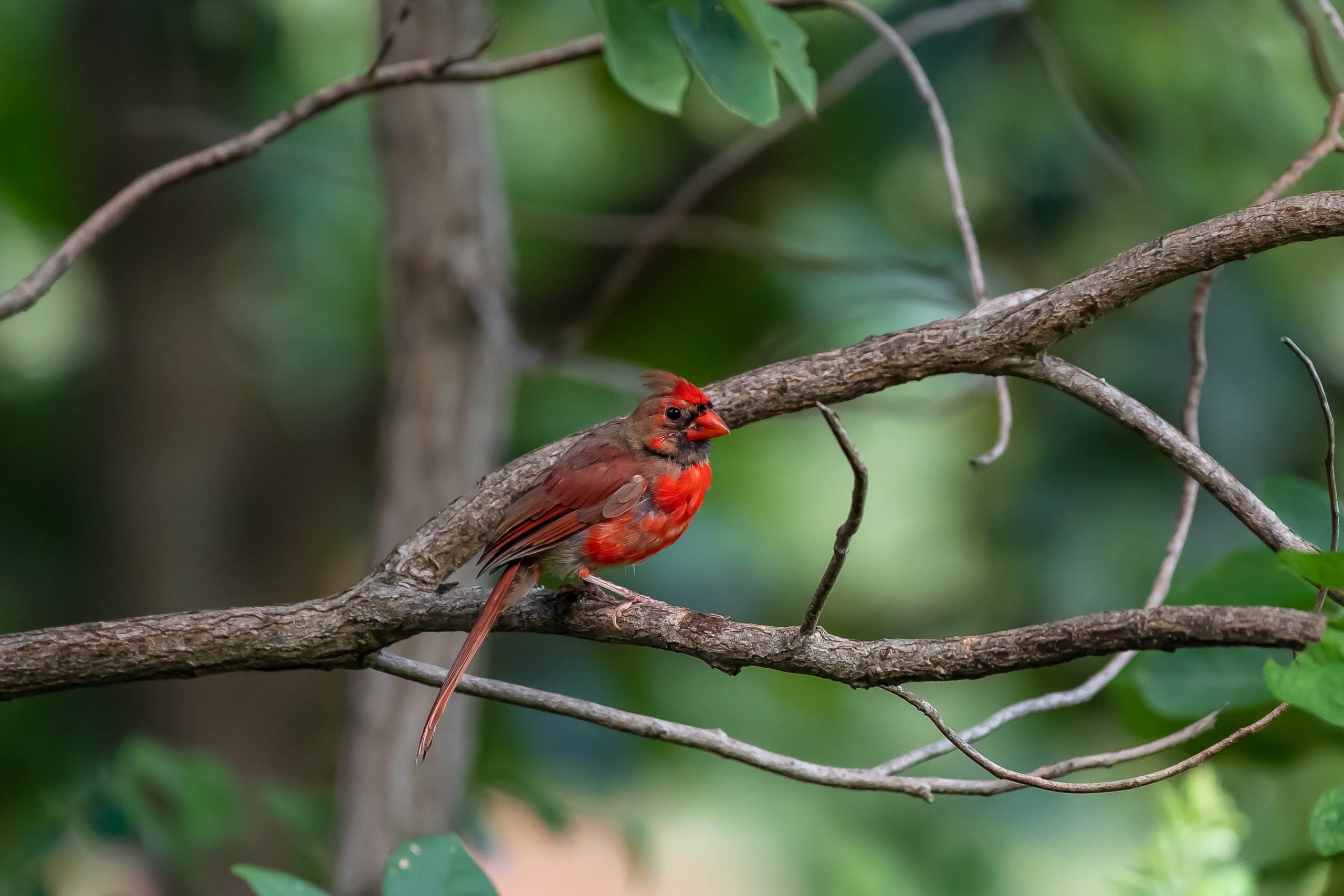
Saturday 26 Sept / 8 Tishrei
When a Bird Crashed Into My Window on a Pre-Yom-Kippur Jewish Meditation Virtual Retreat
It was yoga time
The instructor was guiding us from downward dog to cobra, when I heard a loud thunk.
My mind began to race. I noticed it racing (thanks meditation.) What to do? The guilt of continuing my yoga felt unimaginable and wrong. Interrupting the practice also felt wrong.
I jumped up, turned off my zoom camera, and peeked out the window.
A red cardinal was on her side, just below my window.
The agony of my heart in that moment.
And then:
How could I be so selfish, opening my curtains, not having put up bird-deterrents on this rental house we moved in to months ago?
Do I lift her up? But would that injure her more, if she was still alive? Do I continue yoga? Would that be selfish or energetically healing? I opened the window and I told her, “I’m right here. I’m not leaving you.” (Did Chaplaincy training teach me to be a bird whisperer?)
I did a couple of sun salutations and went back to check on her. She was standing on her feet! She seemed completely stunned and frozen still, except for an occasional blink of the black spheres of her eyes.
I returned to my mat. Warrior 1. Warrior 2. Triangle pose. Check on bird-friend.
Exact same position she was in five minutes ago. Damnit. Google, help!
The first google search was “bird flying into window can be, omen of death coming.”
Yikes. Not ideal four days before Yom Kippur.
Second google search result: stunned birds can often recover from concussions on their own. But if they don’t perk up in five or ten minutes, place them gently in a shoe box, poke holes, and let them recuperate in darkness, away from cats (the article was very insistent on that last part. It felt emotionally charged, like it was written from personal experience.)
I found a box. I lined it with paper towels. I put on the disposable gloves from a box that now sits on the shoe-stand by the front door (thanks coronavirus.)
The yoga class continued in the background. My zoom video was turned off. Tree pose. Root to rise. Breathe in deep. Breathe out deep. Like clockwork my cat was perched on the windowsill, nose on screen, eyes locked with the red cardinal outside.
I went out into the gentle rain, ready and not at all ready to examine little birdie and try lifting her into the box. And just as I arrived to her, she jumped away from me! She moved with such speed! She hopped behind the bush. Her leg was clearly injured, but she couldn’t have been more clear—I need to heal on my own. Don’t rush me.
I stood there a few more moments and bent down to her level. We made eye contact and she continued hopping. Clearly trying to build up her strength to run or fly away.
Through the window I could hear the zoom room…
Lay down on your back, spinal twist…
wafting through the screen window, where my cat still perched.
I came inside chuckling at my journey from gentle Chaplain accompanier to frantic fixer. How deeply uncomfortable it was to watch her stunned. How tempting to read articles about how to fix her—wouldn’t I be complicit in her pain if I didn’t?
It’s hard to watch a precious being be in shock, and just allow them to come out of it on their own, with no guarantee that they will. And in these hard, heavy, unimaginable times we are in, so many of us and our loved ones are in some kind of shock.
Bless that bird who communicated her need for recovery in her own time and way. Bless all those who are trying to communicate please, let me not be okay right now. Bless all those who have to witness dear ones in trauma, pain, illness, and resist every urge to swoop in with gloves and a paper-towel-lined box poked with air-holes. None of these roles are easy.
I’m not sure how long my red cardinal friend will make it. After I came inside, I looked out the window and she was gone from the bushes, nowhere to be seen. Did she make it back to her nest? Did her family of birds find her? Did she pass away gently in the shrubs behind the neighbors’ house? I don’t know. I pray she felt agency, connection, love, whatever happened.
Ana elna refana la… please heal her.
I turned my video back on. Class was winding down. Shavasana. Lay down on your back. Release your whole body into the earth. Let go of everything. Feel everything. Breathe.
* * *
We are in a very special moment of the Jewish calendar. The month of Elul leading up to the holidays is a time of deeper inner reflection. Most especially, the ten days between Rosh Hashanah and Yom Kippur can be a deep time of going inside. But what is the nature of this “going inside?” Rabbi Alan Lew, may his memory be a blessing, writes,
“For ten days, the gates are open and the world is fluid is fluid. We are finally awake, if only in fits and starts, if only to toss and turn. For ten days, transformation is within our grasp. For ten days, we can imagine ourselves not as fixed and immutable beings, but rather as a limitless field upon which qualities and impulses rise up and fall away again like waves on the sea. Some of these impulses rise up with particular intensity. We may even experience them as afflictions, but they can be the keys to our transformation. Their intensity points to the disequilibrium and dysfunction in us that is in need of transformation.”[1]
There is so much to hold right now. What Breonna Taylor’s family faces, what Black people and co-coconspirators for justice face in this week, year, nation of injustice and white supremacy. The impending election, the death of Ruth Bader Ginsberg, may her memory be a blessing, and all that the open seat implies and threatens. The fires, the hurricanes, the climate pain. And, of course, the virus, the virus, the virus. So much to hold. What can tshuvah look like this year? Tshuvah, meaning return, returning back to our true selves, our deepest selves, our most real form of living? Is it even possible?
Perhaps we must remember that stunned red cardinal. Perhaps we each have her inside of us. And perhaps this year we can’t rush in with gloves and a box lined with paper towels and poked with holes, ready to rescue her. Maybe we can’t know how she will get through this. But we have to listen to her saying, “I need it to be okay that I’m not okay right now.” And, “trust me that I will fly again, but I need some time to be stunned in the bushes.” And, “just sit with me. Don’t come too close, but don’t leave me alone. Let’s just be together a while.”
Jewish meditation teacher Rebecca Schisler said this week,
Like the great gift of breath happening on its own, tshuvah can be “a returning without striving. It’s not a mountain to climb. It’s not something out there. Kind of the opposite, actually, it can be. More of a relaxing, more of an allowing. A coming home. Like what happens when we loosen our grip, whatever we are holding so tightly. In Vayikrah, in the Torah, Verse 23, it says…
“Because Yom kippur will atone you before Hashem your God.” This verse in the Torah, the word atonement is reflexive, alechem, you all, is passive, meaning that, Yom Kippur will atone you. You will be atoned. You won’t do atonement, but it will atone you. You can be. And you can allow it to happen to you.”[2] [emphasis added].
This doesn’t mean we don’t take responsibility for where we might have missed the mark, where forgiveness given or received might be in order. But it does mean there can be a loosening, a letting the red cardinal be, letting the holiday work on us and through us. Rabbi Lew writes, “Self-forgiveness is difficult largely because we hold ourselves to such high standards, higher than it is possible to live up to. And it is precisely when we are hardest on ourselves that we are most tempted to bury our misdeeds—to hide from our reality, to deny weakness, to deny that we’ve done anything wrong.”[3] Without the softening inside to the stunned bird within, it is simply too painful, too overwhelming, to imagine really seeing where we might have fallen short this year, both individually and collectively.
May we soften into Shavasana. Release our whole bodies into the earth. Let go of everything for a moment, and feel everything. Breathe. Letting the Days of Awe open us up to our deepest insides, without so much effort. Making space for joy where there is joy—because yes, there still is joy. May we take a step inside, to that bird who doesn’t need a savior, doesn’t need to be rushed, and doesn’t need a frantic fixer, grasping at a future that is not yet here. And may this softness, this slowing down, this pause, rouse us to a place in ourselves that has the courage to see the injustice of anti-Black racism, growing American fascism and white supremacy, climate catastrophe, and global pandemic, and that maybe knows what needs to be done next, what action needs to be taken—but from that place of having arrived at the center of the heart first.
[1] Alan Lew, This Is Real and You Are Completely Unprepared: The Days of Awe as a Journey of Transformation, 1st ed. (Boston, New York, London: Little, Brown and Company, 2003), 151.
[2] Rebecca Schisler, “Returning to Our True Selves: Teaching and Practice.”
[3] Lew, This Is Real and You Are Completely Unprepared: The Days of Awe as a Journey of Transformation, 126.

Lena Sclove (she/her) is a 3rd year MDiv student at Vanderbilt Divinity School, where she is pursuing a concentration in Chaplaincy and a certificate in Jewish Studies. Lena has trained as a Hospice Chaplain through CPE, interned as a Psychiatric Hospital Chaplain through Field Education, and is in the process of applying to Rabbinical School.